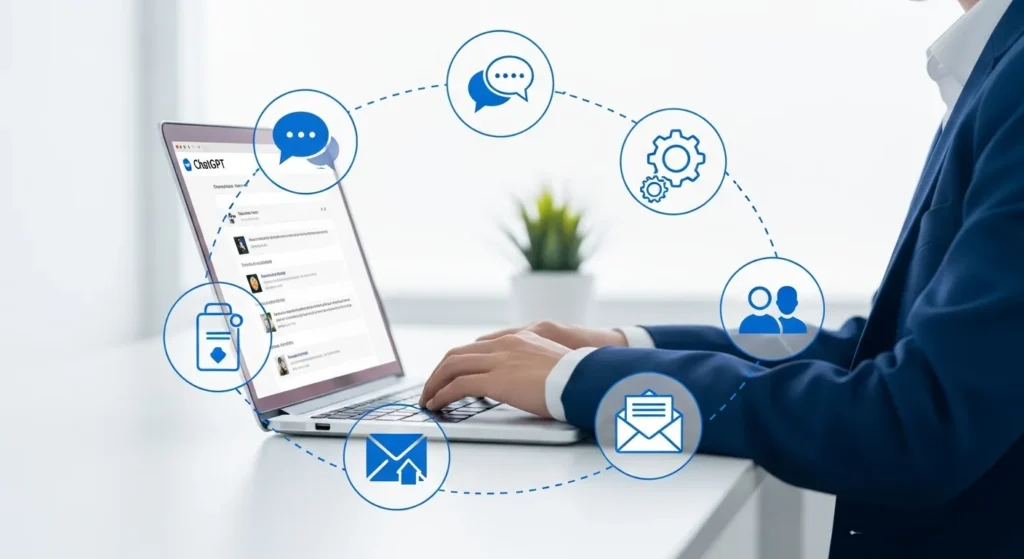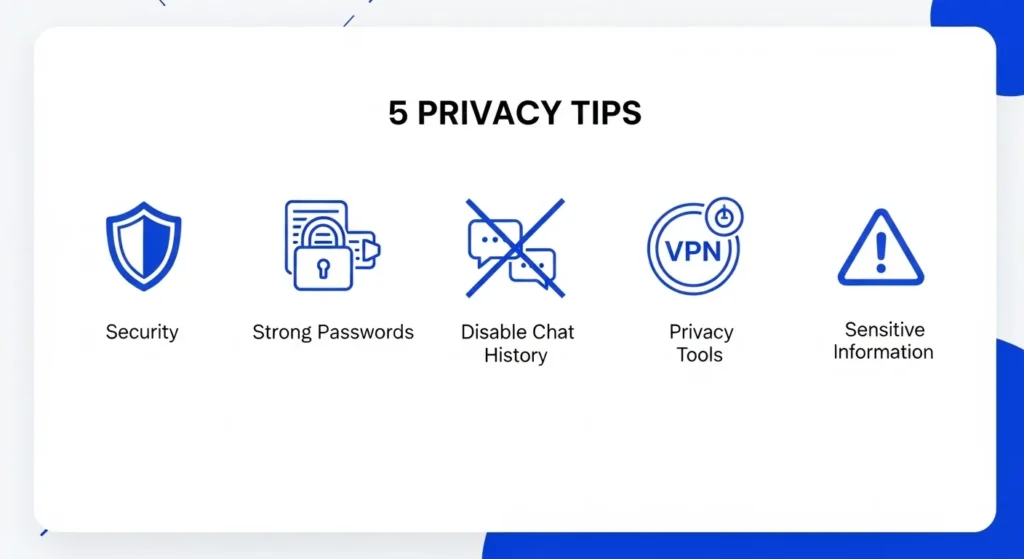Did you know that ChatGPT collects your conversation history and device information? As a powerful AI tool developed by OpenAI, ChatGPT helps millions with tasks like writing, coding, and answering questions. However, its data collection practices raise privacy concerns. In this post, we’ll explain what data ChatGPT tracks, how it’s used, the risks involved, and how you can protect yourself. Whether you’re a student, professional, or casual user, understanding these details is key to staying safe online.

What Data Does ChatGPT Collect?
ChatGPT collects several types of data to function and improve its performance. According to OpenAI’s privacy policy, this includes both information you provide and data collected automatically. Here’s a breakdown:
Account Information
When you sign up or use a premium plan, ChatGPT collects:
- Your name
- Email address
- Device type
- Unique identifiers
Conversation History
Every prompt and response is stored, including:
- Text you enter
- Files you upload (e.g., resumes or documents)
- Chat logs
Device and Location Data
ChatGPT gathers details about your device and location, such as:
- IP address
- Geographical location
- Device name and operating system
Usage Data and Cookies
To track how you interact with the platform, ChatGPT collects:
- Timestamps of your sessions
- Frequency of use
- Cookies to monitor browsing activity
| Data Type | Examples | Purpose |
|---|---|---|
| Account Information | Name, email, device type | User identification, account management |
| Conversation History | Prompts, responses, uploaded files | Model training, user interaction |
| Device/Location Data | IP address, device name, location | Security, personalization |
| Usage Data/Cookies | Session timestamps, browsing activity | Analytics, improving user experience |
This data collection is standard for AI platforms but can feel invasive. Knowing what’s collected helps you decide what to share.
How Does ChatGPT Use Your Data?
OpenAI uses the collected data for several purposes, as outlined in their data management blog. Here’s how:
- Improving the Model: Your conversations help train ChatGPT to provide better responses.
- Personalization: Data like interaction patterns tailors responses to your preferences.
- Security and Monitoring: IP addresses and device data help detect and prevent misuse.
- Research and Development: Aggregated data supports OpenAI’s AI advancements.
OpenAI states it does not use personal data for advertising, but it may share anonymized data with affiliates or comply with legal requests. This means your data could be accessed by third parties in specific cases, such as law enforcement.
Privacy Risks and Concerns
Using ChatGPT comes with privacy risks. Research and posts on X suggest these concerns are valid, especially after past incidents. Here are the main issues:
Data Breaches
ChatGPT has faced security incidents:
- March 2023: A bug in an open-source library exposed chat titles and payment details for 1.2% of ChatGPT Plus users during a 9-hour window. Affected users saw others’ names, emails, and partial credit card information .
- June 2022–May 2023: Over 101,134 ChatGPT accounts were compromised by info stealers, with credentials sold on the dark web .
- December 2023: Researchers extracted over 10,000 memorized training examples, including personal information, raising concerns about data leakage.
Unintentional Sharing
Sharing sensitive information, like financial details or personal secrets, can lead to exposure. For example, Samsung banned ChatGPT in 2023 after employees shared proprietary code, highlighting the risks of accidental leaks.
Potential Misuse
Malicious actors could exploit ChatGPT for phishing or malware creation, increasing risks of data breaches or identity theft. Additionally, biases in training data may lead to problematic responses.
How to Protect Your Privacy When Using ChatGPT
You can take steps to minimize privacy risks while using ChatGPT. Here are five practical tips:
- Avoid Sharing Sensitive Information: Don’t enter personal details like your Social Security number, credit card information, or health data.
- Use Privacy Tools: A VPN or incognito mode can mask your IP address and reduce tracking.
- Turn Off Chat History: Disable chat history in settings to prevent your conversations from being used for training .
- Use Strong Passwords: Protect your account with unique passwords and enable two-factor authentication.
- Be Cautious with Prompts: Avoid including proprietary or confidential information in your prompts, as seen in the Samsung incident.

You can also use ChatGPT without an account for temporary chats, which are deleted after 30 days and not used for training. OpenAI’s privacy portal lets you delete data, opt out of training, or download your data. Check your settings regularly to stay in control.
People Also Ask: Common Questions About ChatGPT Privacy
Is ChatGPT Safe to Use?
ChatGPT is generally safe for casual use, but it’s not fully private. Conversations are stored and may be reviewed by OpenAI for safety and improvement. Avoid sharing sensitive information to minimize risks.
Can ChatGPT Share My Data with Others?
OpenAI doesn’t sell your data or use it for ads, but it may share anonymized data with affiliates or comply with legal requests. Always assume your data could be accessed in specific cases.
How Long Does ChatGPT Keep My Data?
If you delete a chat, it’s removed from your view but retained by OpenAI for 30 days for safety monitoring. Disabling chat history prevents training use, but some data may still be stored.
Can I Use ChatGPT Anonymously?
You can use ChatGPT without an account, but it still collects metadata like IP addresses and device info. Full anonymity isn’t guaranteed, so use privacy tools like VPNs for added protection.
Recent Data Breaches and Incidents
ChatGPT’s history includes several notable incidents that highlight privacy risks:
| Date | Incident | Impact |
|---|---|---|
| March 2023 | Bug in Redis library exposed chat titles and payment details | Affected 1.2% of ChatGPT Plus users; personal and payment info exposed |
| June 2022–May 2023 | Over 101,134 accounts compromised by info stealers | Credentials sold on dark web, primarily in Asia-Pacific |
| December 2023 | Researchers extracted 10,000+ memorized training examples with personal info | Raised concerns about data leakage and privacy vulnerabilities |
| April 2023 | Spain investigated potential GDPR violations by ChatGPT | Highlighted regulatory scrutiny of AI data practices |
These incidents show that while OpenAI works to secure its platform, vulnerabilities exist. Staying informed about such events helps you make safer choices.
Conclusion
ChatGPT tracks various types of data, including your conversations, device details, and account information, to improve its functionality. While this enhances the user experience, it comes with risks like data breaches and unintended exposure. By avoiding sensitive information, using privacy tools, and managing your data settings, you can reduce these risks. OpenAI’s privacy portal offers tools to control your data, but complete anonymity is not guaranteed. Stay cautious and informed to protect your privacy.
For more insights on ChatGPT’s applications, check out our articles on How to Use ChatGPT for Remote Evaluation and Can the Common App Detect ChatGPT?.
